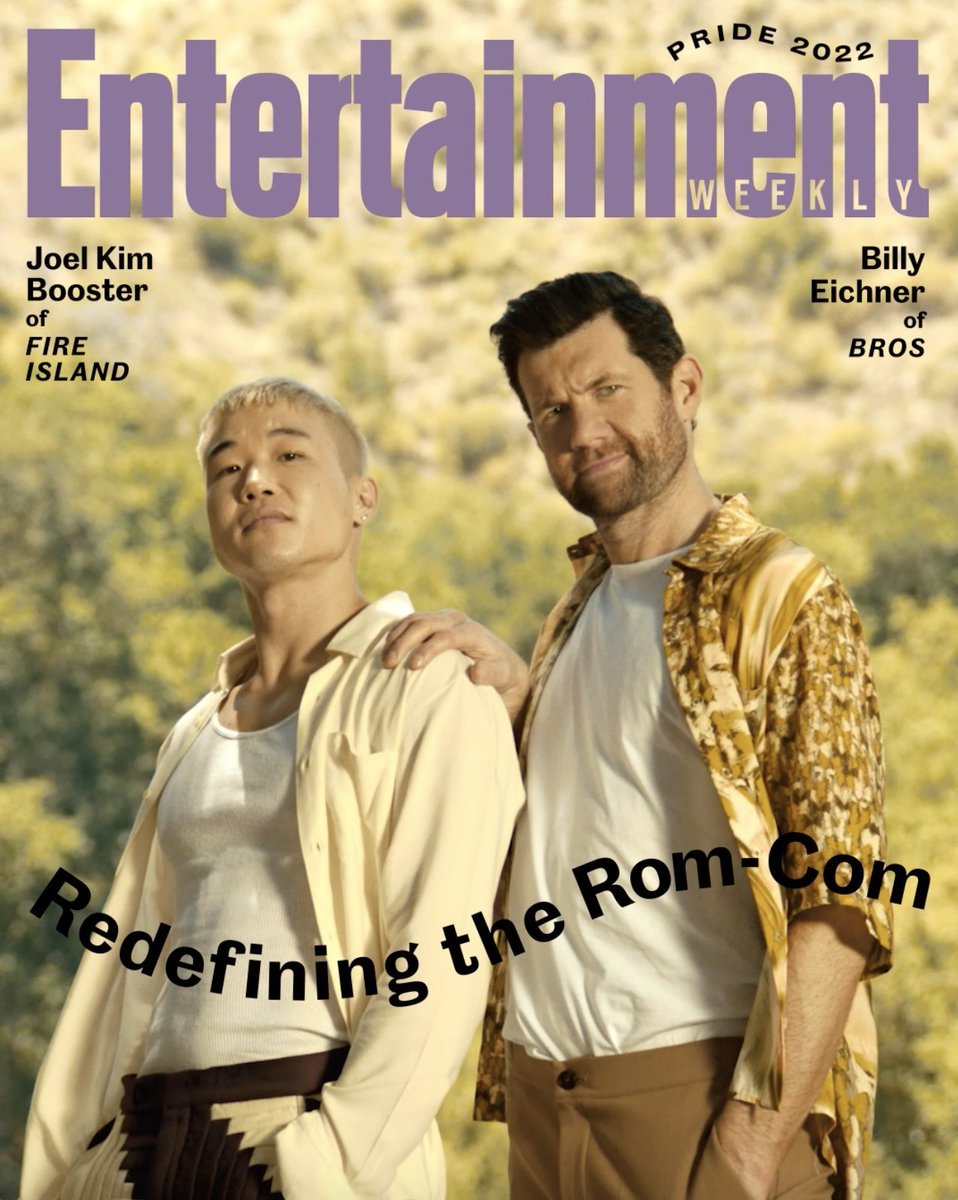Ryan Pfluger / Entertainment Weekly
This September 30th, Universal Pictures will make Hollywood history with the premiere of Bros, the first gay romantic comedy from a major studio. Earlier this week, Billy Eichner, the film’s screenwriter and lead actor, may have “stepped in it” (albeit a little) by saying that his film is “…not an indie movie. This is not some streaming thing which feels disposable, or which is like one of a million Netflix shows.” Now, while I am not here to tar and feather Mr. Eichner, many-a-Twitter troll were happy to take that on. However, in a show of both support and request for accountability, Joel Kim Booster, screenwriter, and lead actor of the gay (and mostly QPOC) rom-com Fire Island, shared his reaction to Billy’s words. Booster wrote via Twitter “It seems like [Eichner] was pretty inarticulate in his excitement about his movie getting a theatrical release, which is really fucking cool and something I’m sure the studio and his publicist is making him constantly talk about,” and continued with “I’m so proud of my movie and all the people who helped make it happen and am so grateful it was accessible to so many people on streaming, and don’t see it as any less valuable because of that.”
When all is said and done, I’m fully Team Billy and absolutely Team Joel (shoutout to Billy Joel too- I guess). This non-existent Twitter feud/true example of people being human shows Billy being excited, “inarticulate”, and accountable and Joel being annoyed, kind, and proud. Moral of the story is Joel is both very attractive and correct… streaming can sometimes be so much more accessible than going to a movie theater, especially when you are young, closeted, and BIPOC.
Okay, enough about these gay movie stars and their “drama” and more about me, a very gay non-movie star!
PICTURE IT! August 1994, I was an eleven-year-old, brown, closeted kid in the suburbs outside of Los Angeles. Bill Clinton was about to face his first midterm election, the Macarena wouldn’t make white people dance awkwardly for two more years, and the critically acclaimed coming of age drama My So-Called Life premiered. While I missed being the target audience by four or so years, the show had a profound effect on my life because of one character- Rickie Vasquez. My So-Called Life was a television show that was new, gritty, and for the time, provocative. It touched on topics such as teen alcoholism, sex, HIV/AIDS, homelessness, and homophobia. Rickie, played by Wilson Cruz, was “one of the girls” as he applied his eyeliner in the girls bathroom as evenly as he provided moral support for his best friend Angela, played by Claire Danes.
At this time in my life, I was a scrawny, quiet teacher’s pet who bonded with my mother over watching taped episodes of Oprah and Roseanne and joined a soccer team, because I knew it would make my dad proud. And while he did, indeed, purchase the pink and turquoise ball I chose, I don’t think he bought my “I like this ball because I’ll be able to tell it apart from everyone else’s at practice” reasoning, my dad was just happy to see me doing “boy things.” And while I was able to get away with my pink/turquoise ball and late-night Oprah, my parents would usually send me away when My So-Called Life would air. Thankfully, they underestimated the persistence of a closeted kid and the lack of energy two working-class parents had for their last born and only boy in a Mexican household.
Mark Seliger / Walt Disney Television via Getty Images
Each week, my parents’ surrender plus one ounce of eleven-year-old machismo swagger granted me access to a new world. Rickie’s story arc was small but mighty and one episode in particular seared its way into my psyche the same way I felt when I walked down the men’s underwear aisle at Wal-Mart. On November 10th, 1994, Rickie’s character made his way to the dance floor with a female classmate. He slowly began to dance to 1993’s Eurodance hit What is Love by Haddaway, and in a sequence of self-conscious dance moves does what so many queer kids want to do- say “fuck it” and dance like no one’s watching. Watching Rickie’s character liberate himself from what others thought and express his truest self was exhilarating. And more than watching a character have their moment, I remember, so vividly, my mother’s reaction… this woman ATE IT UP! Whether it was the story arc being told or vibrant nature of the song, my mom was able to see a brown queer teen live his life out of the shadows, have friends, and be happy.
Media and pop culture, in all its forms, is important. Whether it’s an indie project that FLAWLESSLY retells Jane Austen’s Pride and Prejudice (Okay 94% on Rotten Tomatoes! I see you, Joel!... Pssst, call me!) or a major film debut at the Cannes Film Festival (Okay leading man! I see you, Billy! Pssst call me and give me your co-star Luke Macfarlane’s number!), media has the power to liberate queer brown kids like me as well as educate and even reassure straight brown moms like mine.
Stream Fire Island on Hulu and go see Bros at a theater near you!
~ ~ ~
Searching for a supportive community built for Queer Men of Color?
Check out the private* Facebook group
QMOC Collective
QMOC Collective** is a space for Queer Men of Color to find supportive community, reimagine their goals, and live the life they've been waiting to live!
*QMOC Collective is for community and mental health education purposes only. It is not HIPAA compliant nor a replacement for therapy.
**This Facebook group is intended only for those who identify as Queer Men of Color. Allies, please respect this safe space.




